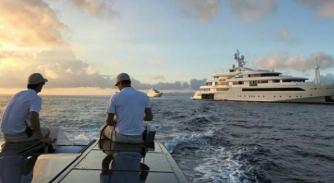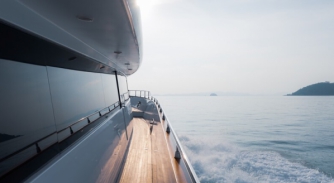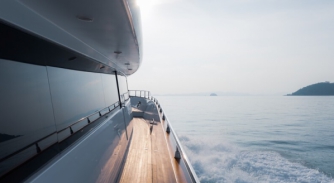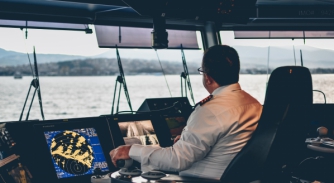‘We must be proactive on crew welfare’
Charles Boyle, director of legal services, Nautilus International, says regulations compliance isn’t enough – crew welfare must take priority…

There’s a distinction between the public perception of the glamorous lifestyle of working on superyachts and the actual reality, which rarely matches that perception. The importance of crew welfare is gaining increasing attention across the entire shipping industry, including that relating to yacht crew. While some regulatory frameworks are trying to address these concerns, it’s evident that more proactive measures are needed to truly enhance the quality of life for crewmembers.
Nautilus is doing much to assist its yacht members, with our legal and yacht teams being kept constantly busy on many issues such as dismissals, unpaid wages, discrimination, bullying and harassment as well as regulatory work with the Maritime and Coastguard Agency and Red Ensign Group.
This contributes to the improvement of crew welfare because working and living conditions on board yachts are vitally important. Therefore, the industry must prioritise the improvement of conditions on superyachts and in shipyards, ensuring they are more appropriate for crew. This is an area covered by the Maritime Labour Convention, 2006, and Flag-state implementation laws, measures and guidance.
The MLC contains extensive mandatory rules and guidelines for the provision of decent accommodation and recreational facilities for seafarers consistent with promoting their health and well-being. The MLC is a ‘living instrument’ and is amended by the International Labour Organization every few years.
The 2022 amendments will come into force in December this year, and most relevant for the superyacht industry will be the requirement for mandatory ‘social connectivity’ on board and, where practicable, owners and ports will have to provide internet access. There will also be a requirement for the mandatory provision of appropriately fitting personal protective equipment, for meals to be balanced and drinking water to be provided free of charge (as is already the case with meals).
The MLC also provides for flexibility in how it is implemented, particularly through the concept of ‘substantial equivalence’ as a means of implementation in cases where it’s impossible to adopt the exact letter of the Convention. The UK’s Tripartite Working Group (TWG) oversees the application of such flexibilities on UK and REG vessels.
 Charles Boyle, director of legal services, Nautilus International
Charles Boyle, director of legal services, Nautilus International
Photo: © Jess Hurd
Particularly important is Part A of the REG Yacht Code, Chapter 21B (applying to yachts more than 200gt), which sets out standards on headroom, ventilation, lighting, food, sleeping accommodation, mess rooms and recreational facilities.
Regarding accommodation, the strict letter of the MLC provides that (except on passenger ships) an individual sleeping room shall be provided for each seafarer. However, in the case of ships of less than 3,000gt or special-purpose ships, the MLC allows exemptions from this requirement to be granted by the Flag state after consultation with the shipowners’ and seafarers’ organisations concerned.
The TWG used this flexibility, as set out in MGN 517, to apply a general substantial equivalence to yachts from 3,000gt to less than 5,000gt, allowing the sharing of a twin cabin by non-officers, with a minimum floor area of at least 11 square metres. The quid pro quo was that each twin cabin must be provided with en-suite sanitary facilities including a WC, a basin and a shower or tub.
The TWG has also been consulted on new-build projects for an equivalence to be applied to yachts more than 5,000gt (which fall outside MGN 517). These applications are carefully scrutinised and approved only if there’s clear evidence the proposals benefit seafarers – for example, crew preferences following a survey of their views. So, in some cases, crew might prefer sharing a cabin in exchange for an en-suite bathroom rather than sharing a bathroom built for six seafarers.
However, mere compliance with regulations isn’t enough. The industry must prioritise the well-being of its workforce by going beyond minimum standards. The upcoming 2022 amendments to the MLC, including mandatory ‘social connectivity’ and improved access to the internet, are steps in the right direction. But more proactive measures are needed to truly enhance the quality of life for crew, both on board and in the yards.
Nautilus will continue to fight for the advancement of the welfare of crew, whether it be by tackling their employment problems or representing their interests with national, regional and global regulators.
This article first appeared in The Superyacht Report – New Build focus. To gain access to The Superyacht Group’s full suite of content, publications, events and services, click here to join The Superyacht Group Community and become one of our members.
The next edition of The Superyacht Report, issue 221 (to be published in June), focuses on captains, crew and operations. We delve into topics from substance abuse among crew and how it can be addressed, to leadership in the industry and how captains and senior leaders can be supported as they progress in their careers.
If you feel you can contribute with insights or information on any aspect of the industry, we would love to hear from you – please contact us on newsdesk.com@thesuperyachtgroup.com
Profile links
NEW: Sign up for SuperyachtNewsweek!
Get the latest weekly news, in-depth reports, intelligence, and strategic insights, delivered directly from The Superyacht Group's editors and market analysts.
Stay at the forefront of the superyacht industry with SuperyachtNewsweek
Click here to become part of The Superyacht Group community, and join us in our mission to make this industry accessible to all, and prosperous for the long-term. We are offering access to the superyacht industry’s most comprehensive and longstanding archive of business-critical information, as well as a comprehensive, real-time superyacht fleet database, for just £10 per month, because we are One Industry with One Mission. Sign up here.
Related news

Are crew lacking leadership?
Despite some efforts being made to improve mental health on board, little has changed. Can senior leaders do more to truly turn the tide?
Crew

No respite in crew mental health cases
ISWAN has reported a dramatic 58% quarter-on-quarter increase in calls to Yacht Crew Help, with women being affected disproportionately
Crew

‘We’ve got to invest in our crew’
The Crew Welfare workshop at The Superyacht Forum looked at mental health, bullying and harassment, unpaid wages, targeted training and confidential helplines
Crew

Demand for crew support grows
Calls to ISWAN’s crew helpline have increased with rising trends in reports of poor mental health, unpaid wages and abuse
Crew

The art of leadership
We speak with Marianne Danissen and Karine Rayson about the value of leadership onboard superyachts
Crew
Related news
Are crew lacking leadership?
2 years ago
No respite in crew mental health cases
2 years ago
‘We’ve got to invest in our crew’
2 years ago
Demand for crew support grows
2 years ago
The art of leadership
4 years ago
NEW: Sign up for
SuperyachtNewsweek!
Get the latest weekly news, in-depth reports, intelligence, and strategic insights, delivered directly from The Superyacht Group's editors and market analysts.
Stay at the forefront of the superyacht industry with SuperyachtNewsweek



